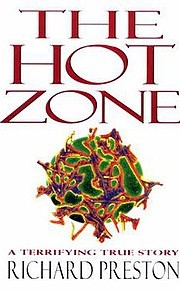
“The Hot Zone” is a non-fiction book written by Richard Preston and published in 1994. The book tells the story of several outbreaks of deadly viruses, including Ebola and Marburg, and the efforts of scientists and doctors to contain them. The book is set primarily in Africa, but also includes accounts of outbreaks in the United States.
The book begins with a description of an outbreak of Ebola virus in a monkey house in Reston, Virginia in 1989. The virus had been imported from the Philippines and had infected a shipment of monkeys that had been sold to a research lab in Reston. The virus was highly lethal to monkeys but did not cause illness in humans. The book describes the efforts of scientists and government officials to contain the virus and prevent its spread.
The book then turns to Africa, where the Ebola virus had caused several outbreaks in the past. The book describes the symptoms of Ebola, which include fever, vomiting, and internal bleeding. The virus is highly contagious and can be transmitted through contact with bodily fluids. The book describes the efforts of doctors and researchers to track down the origins of the virus and develop treatments.
The book tells the story of a particular outbreak of Ebola in a small village in Sudan in 1976. The virus had spread rapidly and had killed over 90% of the villagers who had been infected. The book describes the efforts of a team of doctors from the Centers for Disease Control (CDC) to contain the outbreak and prevent its spread. The doctors risked their own lives to enter the village and take samples from infected patients. They also worked to educate the villagers about the virus and how to prevent its spread.
The book also tells the story of another outbreak of Ebola in a small town in Zaire (now the Democratic Republic of Congo) in 1976. The virus had spread to a nearby hospital, where it had infected several doctors and nurses. The book describes the efforts of a team of doctors from Belgium to contain the outbreak and prevent its spread. The doctors had to work in difficult conditions, with limited resources and a lack of knowledge about the virus.
Throughout the book, Preston highlights the heroism and dedication of the doctors, nurses, and scientists who work to contain these deadly viruses. He also underscores the importance of public health measures, such as quarantine and isolation, in preventing the spread of disease.
“The Hot Zone” is a gripping and informative book that offers a detailed account of the science and politics of infectious diseases. Preston’s prose is vivid and engaging, and he offers a clear and compelling explanation of the science behind these deadly viruses. The book offers a sobering reminder of the risks that we face from infectious diseases, and the importance of investing in public health measures and research to prevent their spread.
